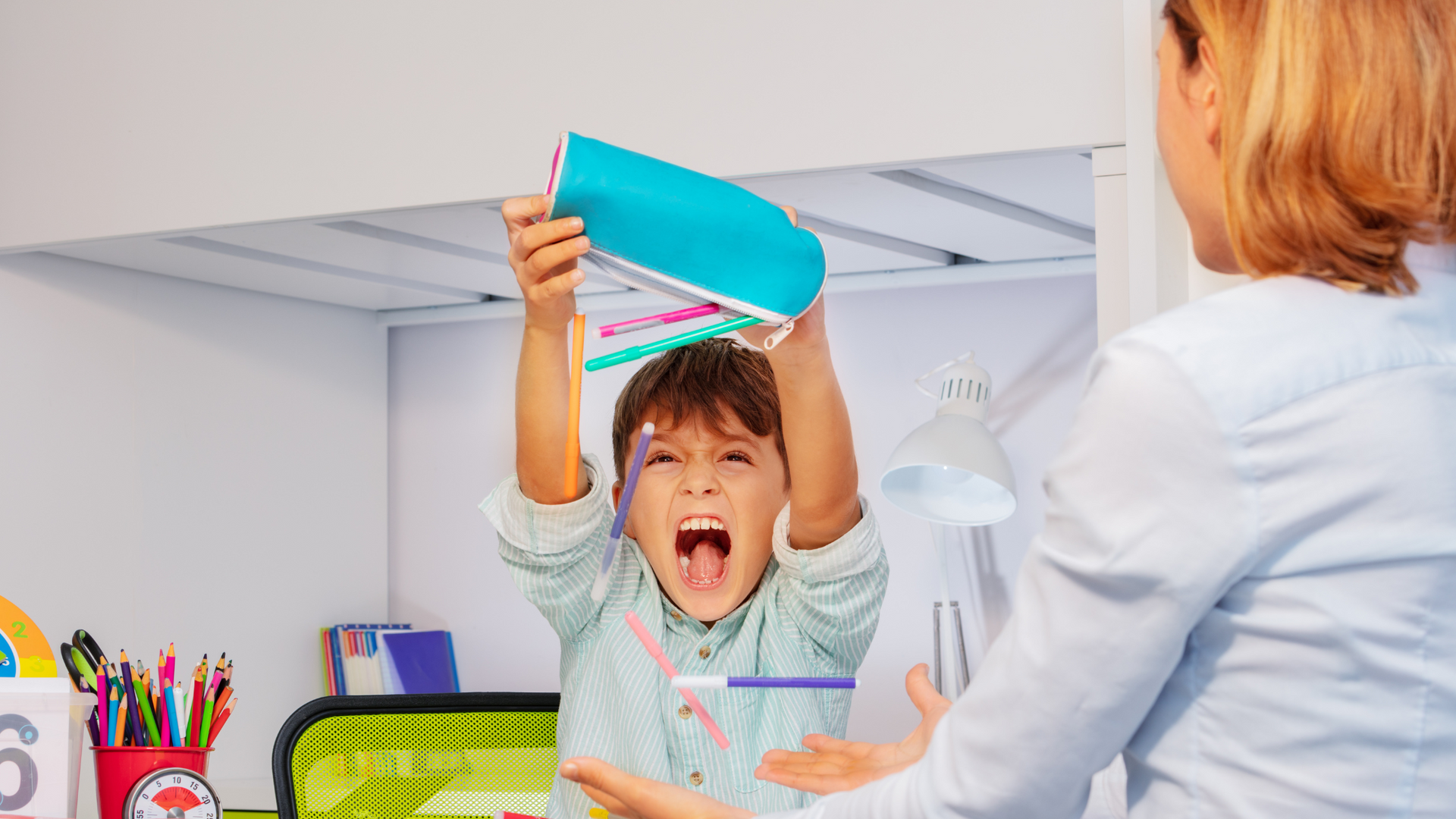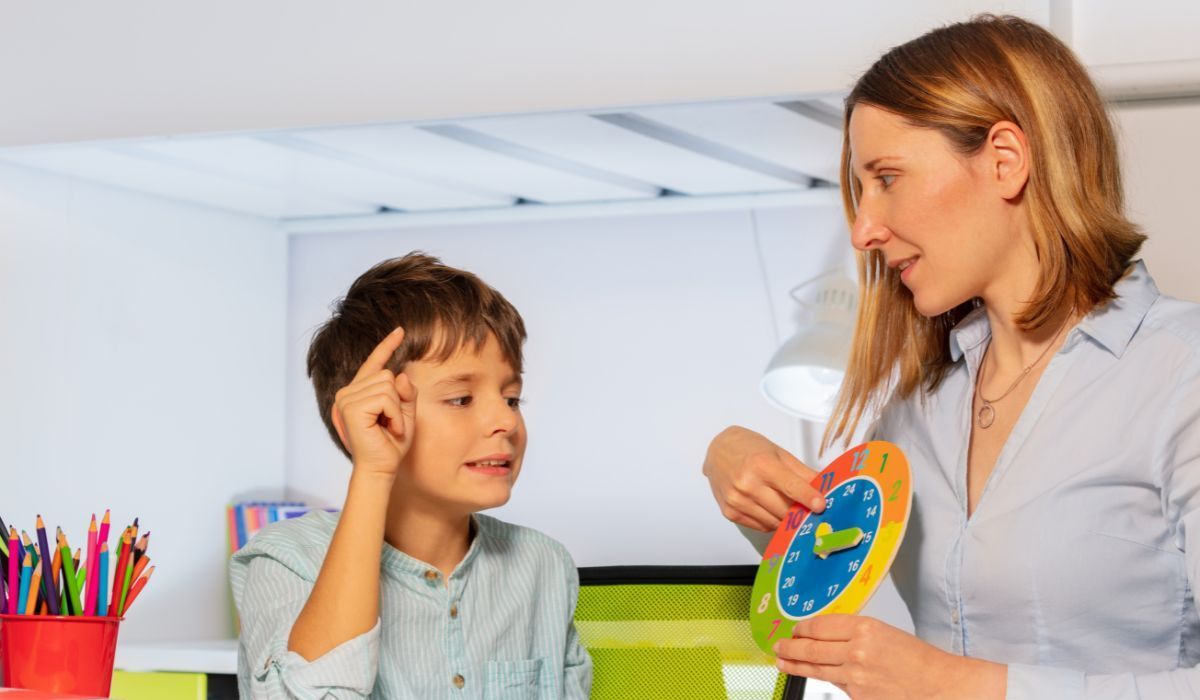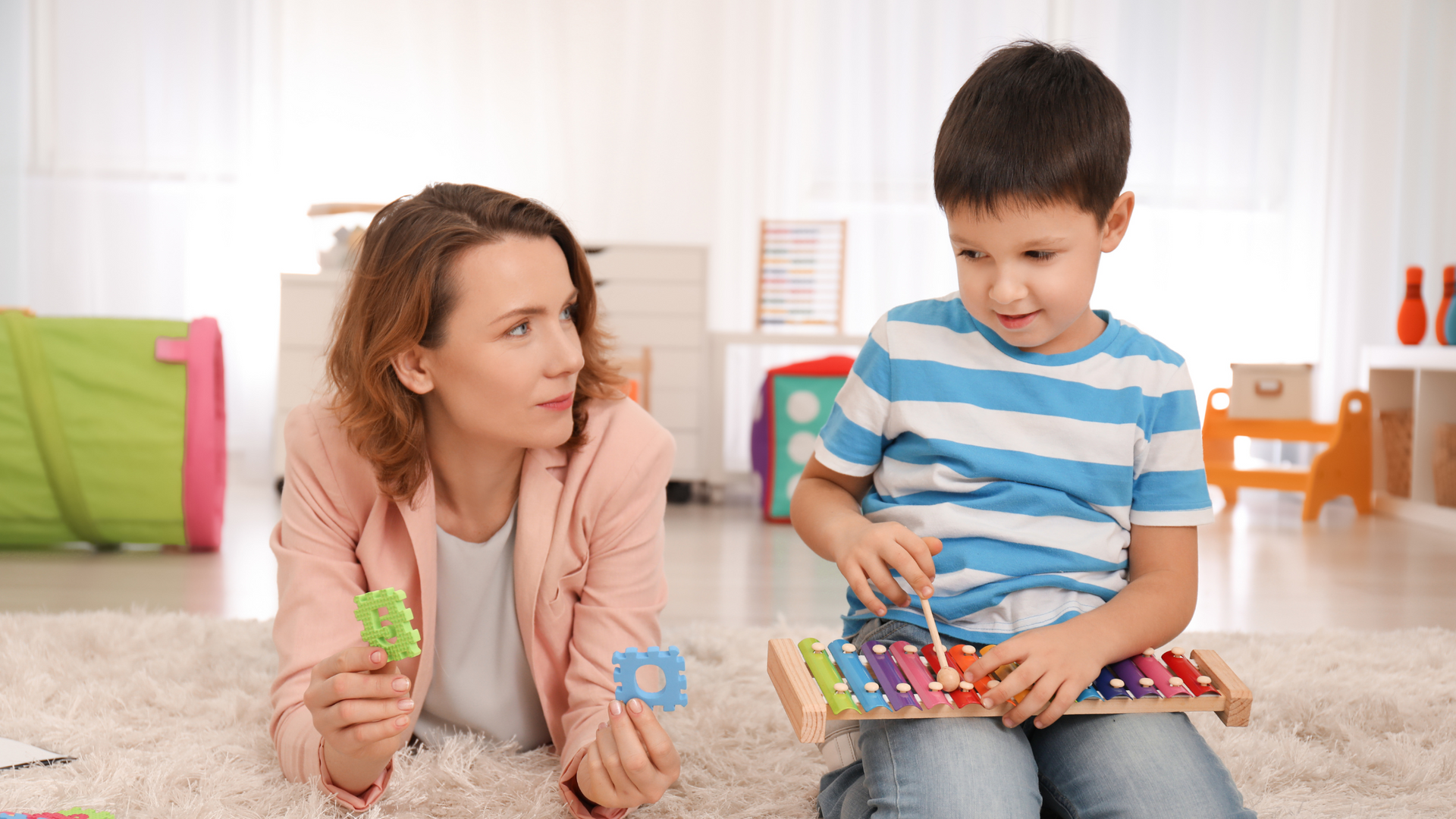How to Handle Aggressive Behavior in Children with Autism
July 16, 2025
Handling Aggression in Children with Autism

If you're reading this, you're probably a parent, caregiver, teacher, or therapist who deeply cares about a child on the autism spectrum. And maybe—just maybe—you’ve felt frustrated, confused, or even heartbroken when that child lashes out in ways you don’t fully understand. Maybe they hit, kick, bite, yell, or throw things.
Here’s the truth: aggressive behavior in children with autism is not uncommon. And more importantly, it’s not your fault. The good news? With the right support, tools, and compassion, you can help guide that child toward calmer, safer ways to express themselves.
Let’s explore how.
Understanding Aggression in Autism
Aggression doesn’t happen in a vacuum. For many kids with autism, aggressive behavior is communication—plain and simple. When language is hard, sensory input is overwhelming, and routines feel shaky, hitting or screaming can become the only way to say, “I’m scared,” “I’m frustrated,” or “I need help.”
Some common triggers include:
- Sensory overload (loud noises, bright lights, itchy clothing)
- Changes in routine
- Difficulty expressing needs or wants
- Unmet physical needs (hunger, tiredness, discomfort)
- Social misunderstandings
- Anxiety
So before we correct a behavior, we have to first understand it. That’s where Applied Behavior Analysis (ABA) therapy comes in.
How ABA Therapy Helps with Aggression
Applied Behavior Analysis (ABA) is one of the most trusted, research-backed methods for supporting children with autism. At Able Minds ABA, we focus on understanding the function behind the behavior—meaning we ask, why is this child acting out?
Our trained ABA therapists in Maryland conduct a thorough initial assessment to look at behavior patterns, triggers, and reinforcers. Once we gather the full picture, we create a custom plan that addresses aggressive behaviors step by step.
With consistent sessions—often in-home ABA therapy—we help children learn safer, more effective ways to communicate and cope.
Strategies You Can Use at Home
Even if you’re not a trained therapist, there are ways you can help at home. Whether you're a parent or caregiver, these tips can bring structure, calm, and growth to your everyday routines.
1. Stay Calm and Neutral
We get it—when your child throws something or hits you, staying calm is easier said than done. But your response sets the tone. Keep your voice low, your body language open, and your facial expression neutral.
Aggressive outbursts can escalate if your child sees they’re getting a big emotional reaction. Instead, model calmness, and they’ll learn from you.
2. Identify Triggers
Look for patterns. Is your child more aggressive:
- After school?
- During transitions (like getting dressed or leaving the house)?
- When a specific person is around?
- In loud or crowded spaces?
Tracking behaviors in a behavior log can help you and your ABA team identify trends and create better-prepared routines.
3. Offer Clear Choices
Kids with autism often feel more secure when they have some control. Instead of saying, “Put on your shoes now,” try offering a choice: “Do you want to wear your blue shoes or your red shoes?”
Giving options—especially visual ones—can reduce stress and prevent meltdowns.
4. Reinforce Positive Behavior
One of the cornerstones of ABA therapy for autism is positive reinforcement. That means catching your child doing something right—even if it’s small.
Did they ask for a snack instead of screaming? Praise it.
Did they keep their hands to themselves for 10 minutes? Celebrate it.
Reinforcement motivates behavior change more effectively than punishment ever could.
5. Teach Communication Skills
Aggression often stems from communication breakdowns. If a child doesn’t have the words—or tools—they need, they may resort to hitting or screaming.
ABA therapy can teach:
- Sign language
- Picture Exchange Communication System (PECS)
- Speech-generating devices
- Simple verbal phrases
At Able Minds ABA, we meet kids where they are—and build communication plans that truly fit their learning style.
The Power of In-Home ABA Therapy
Some of the most meaningful progress happens not in a clinic, but right at your kitchen table, on your living room couch, or in your child’s bedroom.
In-home ABA therapy allows therapists to:
- Address behaviors in the environment where they occur
- Build trust in a familiar, safe space
- Create consistent routines within the home
- Coach parents and caregivers in real time
If you’ve been searching for in-home ABA therapy near me, know that Able Minds ABA proudly offers flexible, family-centered care across Maryland.
Why Professional Support Matters
Aggressive behavior can be draining—not just for the child, but for the whole family. You're juggling appointments, safety concerns, daily stress, and sometimes even judgment from people who just don't get it.
That’s why having a committed ABA team is more than just helpful—it’s essential.
When you work with a board-certified behavior analyst (BCBA) and a skilled registered behavior technician (RBT), you get:
- Professional assessments
- Personalized treatment plans
- Parent and caregiver training
- Insurance support
- Regular progress updates
You don’t have to navigate this alone.
Family Support: You're Part of the Team
At Able Minds ABA, we believe in supporting the whole family—not just the child. That’s why we offer parent and caregiver training to empower you with skills and strategies you can use every day.
You’ll learn:
- How to respond to aggression without reinforcing it
- How to use proactive behavior supports
- How to stay consistent (even on tough days)
- How to track progress and celebrate wins
You’ll never be left in the dark. We keep communication open and clear, with regular updates and collaboration. Because your child’s growth is a team effort.
Common Misconceptions About Aggression and Autism
Let’s clear up a few myths:
“The child is just being bad.”
Absolutely not. Children with autism aren’t choosing aggression to misbehave—they’re using the tools they have. Our job is to give them better ones.
“They’ll grow out of it.”
Without proper support, aggressive behavior often continues—and sometimes worsens. Early, proactive therapy like ABA can make all the difference.
“ABA is just strict discipline.”
Not at all. ABA is rooted in positive reinforcement, empathy, and individualization. It’s about progress, not punishment.
ABA Careers That Change Lives
If you’re a BCBA or RBT looking to make an impact, Able Minds ABA is hiring! We offer:
- Supportive leadership
- Flexible scheduling
- A mission-driven culture
- Opportunities to grow with a team that values your work
Check out our open BCBA jobs in Maryland or RBT jobs near me and start building a career that truly matters.
Your Next Step Starts Here
Aggression doesn’t define your child. And it doesn’t define you, either.
At Able Minds ABA, we’re committed to helping children with autism thrive—with compassionate, evidence-based ABA services in Maryland that meet your family where you are.
Whether you need in-home ABA therapy, parent training, or help navigating insurance, we’re here for you—every step of the way.
Let’s Take the First Step Together
Ready to get started?
Fill out our form to schedule a free consultation and learn how Able Minds ABA can support your child’s growth, one peaceful step at a time.
FAQs: Handling Aggressive Behavior in Children with Autism
What causes aggressive behavior in children with autism?
Aggressive behavior often stems from communication challenges, sensory overload, or unmet needs. Many children with autism act out when they’re overwhelmed or can’t express themselves. ABA therapy helps uncover the root causes and teaches safer coping strategies.
How can ABA therapy help reduce aggression?
ABA therapy identifies the function of the behavior—what the child is trying to gain or avoid—and then teaches positive alternatives. With a structured, personalized plan and reinforcement techniques, children learn better ways to express emotions and needs.
Is in-home ABA therapy effective for managing aggression?
Yes! In-home ABA therapy brings treatment into the child’s natural environment, making behavior strategies more relevant and consistent. It also allows therapists to coach caregivers directly and adjust techniques in real-time.
Can parents be involved in the behavior plan?
Absolutely. Parent and caregiver training is a key part of ABA services. You’ll learn how to manage aggressive behavior, respond calmly, and reinforce positive actions, all while working closely with your ABA therapist in Maryland.
How long does it take to see results from ABA therapy?
Every child is different, but many families notice improvements in the first few months. Consistency, communication, and teamwork between the therapist and family are critical for long-term success in reducing aggressive behavior.
Is aggressive behavior permanent in children with autism?
Not at all. With the right support—like ABA therapy, communication tools, and caregiver guidance—most children can learn new, more appropriate ways to express themselves. Progress takes time, but change is absolutely possible.
What should I do in the moment when my child becomes aggressive?
Stay calm, ensure everyone’s safety, and try to reduce stimulation. Avoid yelling or reacting emotionally. Once the moment has passed, work with your ABA therapist to analyze the trigger and adjust your child’s behavior plan accordingly.
Can ABA therapy help nonverbal children with aggressive behavior?
Yes. ABA therapy is highly effective for nonverbal children, using tools like PECS, sign language, or assistive devices to replace aggression with communication. Therapists tailor strategies based on your child’s strengths and needs.

Choosing the right ABA therapy provider is a crucial step toward helping your child achieve greater independence, improved communication, and better social skills. In Maryland, families are fortunate to have a growing number of options for applied behavior analysis therapy , but with so many choices, it can be overwhelming to know where to begin. Whether your child has just received a diagnosis or you’re transitioning between providers, selecting the best fit means looking beyond the surface. The right provider offers not just therapy sessions—but compassionate care, individualized plans, and a team committed to your child’s long-term success. What Is Applied Behavior Analysis (ABA) Therapy? Applied behavior analysis therapy is a science-backed intervention that focuses on understanding and improving behaviors. It’s particularly effective for children who face developmental and behavioral challenges, such as autism. ABA breaks down complex skills into manageable steps and uses positive reinforcement to help children master those skills. A certified applied behavior analyst therapist develops personalized programs tailored to each child's strengths, challenges, and goals. Over time, ABA can help build critical life skills such as communication, emotional regulation, cooperation, and self-help. Why Finding the Right ABA Provider in Maryland Matters Not all ABA therapy providers offer the same level of care. In a state like Maryland—with diverse communities from Baltimore to Silver Spring to Annapolis—parents must carefully evaluate local providers based on their approach, credentials, and experience. Choosing the right partner for your child’s development ensures: Faster progress through tailored interventions Stronger collaboration between family and therapists Better preparation for school and social life Whether you're seeking applied behavioral analysis Maryland services in-home or in-clinic, quality and fit matter. Step-by-Step Guide to Choosing the Best ABA Therapy Provider in Maryland 1. Confirm Credentials and Certification The most reputable ABA therapy providers in Maryland are staffed with: Board Certified Behavior Analysts (BCBAs) – who design and oversee your child’s treatment Registered Behavior Technicians (RBTs) – who implement the therapy under BCBA supervision Always verify the provider is licensed to deliver applied behavior analysis therapy in Maryland. Check credentials through: Behavior Analyst Certification Board (BACB) Maryland Department of Health 2. Ask About Treatment Philosophy No two children are alike. That’s why effective ABA therapy is never “cookie-cutter.” Look for providers who: Conduct detailed initial assessments Develop individualized treatment plans Use data to guide decisions Adjust strategies as your child grows The best applied behavior analyst therapists focus on creating measurable, achievable goals tailored to your child’s unique needs. 3. Explore the Service Delivery Options Depending on your child’s needs and your lifestyle, you may prefer: In-home ABA therapy : Delivered in the comfort of your home for real-life skill-building Clinic-based ABA therapy : Offers structured learning environments and peer interaction School-based support : Collaborates with educators to reinforce skills during school hours Telehealth : Ideal for remote or flexible support Ask if the provider supports families throughout the state or in specific regions (e.g., Montgomery County, Prince George’s County, or Baltimore City). 4. Check Insurance Coverage and Billing Transparency Therapy can be costly, but the right provider will help you navigate: Maryland Medicaid and private insurance plans Out-of-pocket cost estimates Prior authorizations Payment plans or financial assistance A high-quality provider will also assign a care coordinator to support you with insurance paperwork and communication. 5. Learn About Staff Training and Retention Children thrive on consistency. A reliable provider invests in: Ongoing staff training Low staff turnover Regular BCBA supervision of RBTs Therapeutic consistency (same therapist assigned regularly) A committed and experienced applied behavior analyst therapist can form a meaningful bond with your child and deliver more effective results. 6. Understand Family Involvement You are an essential part of your child’s therapeutic journey. The best ABA providers offer: Weekly parent training and coaching Opportunities to observe sessions or review data Monthly progress meetings Tools to continue behavior strategies at home Providers who embrace family-centered care lead to stronger outcomes and smoother integration of skills into daily life. 7. Ask for Success Stories and References Don’t hesitate to ask: How many families they’ve served in Maryland Testimonials or references from current clients Case examples (anonymized) that match your child’s challenges Reading Google reviews, Facebook feedback, and local parenting forums can also give insight into the provider’s reputation in your community. 8. Visit the Facility or Schedule a Virtual Tour Seeing the environment where your child will receive therapy is invaluable. While there: Observe how therapists interact with children Look for clean, safe, and well-equipped spaces Ask about the ratio of children to therapists For in-home aba therapy, ask what materials and resources the therapist will bring and how sessions are structured. 9. Evaluate Their Communication and Responsiveness Strong communication is key. Your provider should: Respond promptly to inquiries Clearly explain the assessment process and therapy goals Be transparent about timelines, policies, and staff You should feel supported—not rushed—through the intake and onboarding process. 10. Trust Your Instincts Ultimately, choosing an ABA therapy provider is a personal decision. If you feel that a provider listens to your concerns, understands your goals, and truly cares about your child’s progress, that’s a strong sign you’re in the right place. Leading Providers Offering Applied Behavioral Analysis in Maryland Some trusted names to begin your search include: Able Minds ABA – A provider offering applied behavior analysis therapy across Maryland with flexible in-home services and experienced clinicians. Behavioral Framework Verbal Beginnings Key Connections ABA Services Each of these organizations provides certified applied behavior analyst therapists and offers individualized programs designed for success. Final Thoughts Choosing the best ABA therapy provider in Maryland doesn’t have to feel overwhelming. When you understand what to look for—from credentials and personalized care to communication and insurance support—you can find a team that fits your family’s needs and empowers your child to thrive. By investing in quality applied behavioral analysis Maryland services, you’re laying the foundation for a brighter, more independent future for your child.









